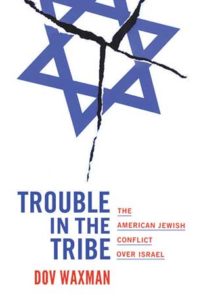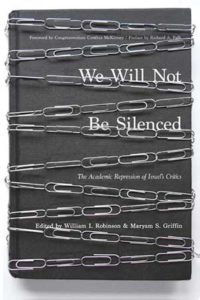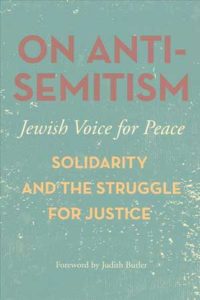Trouble in the Tribe; We Will Not Be Silenced; On AntiSemitism
Reviewed by Steve Chase
March 1, 2018
 Trouble in the Tribe: The American Jewish Conflict Over Israel
Trouble in the Tribe: The American Jewish Conflict Over Israel
By Dov Waxman. Princeton University Press, 2016. 316 pages. $29.95/Hardcover; $19.95/Paperback; $29.95/eBook.
We Will Not Be Silenced: The Academic Repression of Israel’s Critics
Edited by William I. Robinson and Maryam S. Griffin. AK Press, 2017. 222 pages. $19.95/Paperback; $19.95/eBook.
Buy from QuakerBooksOn AntiSemitism: Solidarity and the Struggle for Justice
By Jewish Voice for Peace. Haymarket Books, 2017. 271 pages. $19.95/Paperback; $19.95/eBook.
Buy from QuakerBooks
In July of 2017, three U.S. Jews were blocked from traveling to Israel under the newly instituted Israeli anti-BDS activist travel ban. This new legislation blocks entry into Israel–Palestine of anyone who supports nonviolent economic activism that encourages the State of Israel to follow international law and honor the human rights of Palestinians. The response by the U.S. Jewish community to the banning of U.S. Jews from Israel was both quick and varied.
The organization Jewish Voice for Peace (JVP) protested the Israeli government’s treatment of their members and the Muslims and Christians who were part of their interfaith peace delegation. Jewish Voice for Peace immediately denounced the government effort to block JVP’s challenge to the brutal Israeli occupation, dispossession, and discrimination against the Palestinians. Less progressive, but still liberal groups such as J Street, which opposes both the Israeli occupation and the international Boycott, Divestment, and Sanctions (BDS) Movement supported by Jewish Voice for Peace, spoke out against the travel ban and deplored the breakdown of democracy in Israel and the increasingly repressive and authoritarian Netanyahu government. Other more mainstream or moderate U.S. Jewish groups said they were aggrieved that any U.S. Jews would support the BDS Movement and said Israel was justified in its legislative action to defend itself against the growing international BDS campaign. More right wing U.S. Jewish groups and leaders described their banned Jewish brothers and sisters as “traitors,” “self-hating Jews,” and “anti-Semites.”
This wide diversity of opinion within the U.S. Jewish community is the central focus of Dov Waxman’s insightful book Trouble in the Tribe: The American Jewish Conflict Over Israel. In this book, Waxman, a professor at Northeastern University, explains that while support for the State of Israel once brought American Jews together, Israel’s ongoing policies towards the Palestinians are now driving American Jews apart in a debate that is increasingly marked by incivility, name calling, censorship, shunning, and blacklisting.
This diversity of opinion is not completely new, says Waxman, who also explains how the once historic unity among American Jews on Israel and Zionism “was never as pronounced or prolonged as many believe.” To make his case, he documents how there have always been at least four camps or perspectives within the American Jewish community in relationship to Zionism and the State of Israel: the disinterested, the devoted, the disillusioned, and the dissident. While these outlooks have risen or declined during different periods, all of these perspectives have existed within the U.S. Jewish community since the beginning of the Zionist movement in the late 1800s.
For many decades, the largest group was the disinterested. The two decades after the Six Day War, however, were likely the golden age of unified, and fairly uncritical, devotion to the State of Israel within the U.S. Jewish community. Yet, as Waxman notes, starting in the early 1980s, this outlook started to decline as more and more U.S. Jews, especially younger and more progressive Jews, defected from the devoted camp and increasingly joined the ranks of the disillusioned as they learned about the human rights situation in Israel–Palestine. Many of these people ultimately joined the ranks of the dissidents, decisively breaking with the once dominant taboo against publicly criticizing the State of Israel’s policies against the Palestinians.
Yet, as Waxman also makes clear, the devoted camp still represents a well-organized and large percentage of the U.S. Jewish community to this day. It represents at least a large plurality of the community. Even so, the percentage of U.S. Jews who embrace this perspective without any strong critical views of Israeli policy has been declining for years, and Waxman describes an emerging new majority of U.S. Jews roughly spanning the devoted but dissatisfied, the disillusioned, and the dissident camps. After looking closely at the public opinion polling of the U.S. Jewish community, he writes:
Israeli leaders should expect growing American Jewish pressure to change Israel’s policies, especially toward Palestinians in the Occupied Territories. Growing numbers of American Jews, even a majority now, are dissatisfied with Israel’s treatment of the Palestinians and deeply worried about Israel’s ability to remain a Jewish and democratic state if it continues to effectively rule over Palestinians in the West Bank and East Jerusalem. They want Israel to stop its continued expansion of Jewish settlements, and resume serious peace talks with the Palestinians aimed at achieving a two-state solution to the conflict.
As an activist Quaker who supports human rights for all residents of Israel–Palestine, my own outlook has become essentially identical to the members of Jewish Voice for Peace, which is a remarkable organization. As noted on its website, JVP “is a national, grassroots organization inspired by Jewish tradition to work for a just and lasting peace according to principles of human rights, equality, and international law for all the people of Israel and Palestine.” Founded in 1996 by three college students, JVP now has “over ten thousand members and over sixty chapters across the United States, a Rabbinic Council, an Artists’ Council, an Academic Advisory Council, a Student Network, and an Advisory Board consisting of some of the best-known Jewish thinkers of our time.” Back in the 1960s, ‘70s, or ‘80s, such a fast-growing Jewish activist organization supporting the Palestinian right of return, full equality for Palestinian citizens of Israel, and the end of the Israeli Occupation and the Apartheid Wall was simply unimaginable. Yet, here they are, giving flesh and blood reality to Waxman’s academic observations.
Such shifts in the outlook of the U.S. Jewish community, and among non-Jewish U.S. citizens like me, go a long way to explain the rising panic of key parts of the organized U.S. Jewish establishment who are still among the uncritically devoted. As Waxman notes, these “center-right” and “right-wing” representatives of the U.S. Jewish establishment have increasingly engaged in very strident invective against disillusioned U.S. Jews who no longer fully support Israel’s policies. These leaders have become particularly aggressive towards those who vocally oppose Israel’s policies of dispossession, occupation, and discrimination against the Palestinian people.
 Waxman identifies this pattern of attack, but it is not the main focus of his book. It is, however, the core focus of the new anthology edited by William Robinson and Maryam Griffin entitled We Will Not Be Silenced: The Academic Repression of Israel’s Critics. The big idea here is that the staff, volunteers, and supporters of the hardline U.S. Jewish groups that still support the status quo in Israel–Palestine have taken aim at active dissidents within the Jewish community, other religious groups, the progressive movement, academia, and public opinion around the world. According to Robinson and Griffin, these hardliners have decided to unleash a campaign of slanderous attacks and criminalization to silence all U.S. critics of Israel’s policies towards the Palestinians.
Waxman identifies this pattern of attack, but it is not the main focus of his book. It is, however, the core focus of the new anthology edited by William Robinson and Maryam Griffin entitled We Will Not Be Silenced: The Academic Repression of Israel’s Critics. The big idea here is that the staff, volunteers, and supporters of the hardline U.S. Jewish groups that still support the status quo in Israel–Palestine have taken aim at active dissidents within the Jewish community, other religious groups, the progressive movement, academia, and public opinion around the world. According to Robinson and Griffin, these hardliners have decided to unleash a campaign of slanderous attacks and criminalization to silence all U.S. critics of Israel’s policies towards the Palestinians.
In the foreword to Robinson and Griffin’s book, a claim by a former U.S. congressperson and critic of Israel’s anti-Palestinian policies is quoted that those who support Palestinian rights and the BDS campaign are now facing “a virulent, organized public relations smear campaign unleashed by devotees of Israel in some cases, even paid for by the State of Israel.” When I started reading the book, this particular statement seemed exaggerated to me. As I read each new chapter laying out different people’s firsthand accounts of being on the receiving end of this smear campaign, my view shifted.
I was particularly drawn to the chapter written by Lisa Rofel, a Jewish professor at the University of California in Santa Cruz. In 2008, she organized a symposium on her campus to provide a forum for Jewish and Israeli dissidents to share their substantive criticisms of key aspects of mainstream Zionism and the State of Israel’s policies towards Palestinians. She also invited two Israeli soldiers to speak about why they refuse to serve in the Occupied Territories. Immediately after the event, Rofel reports, “I was put on a list posted on the Internet, called Self-Hating Jews.” After this, she notes, “I received about 1,000 hate emails from people who did not attend the event, comparing me to the Nazis and accusing me of helping another Holocaust to take place.” As she further explains, many of her colleagues “also received these hate emails as did the event participants, the chair of my department, and the chancellor.”
Rofel was also brought up on charges of hate speech by two colleagues through the campus Committee on Academic Freedom. When the Committee dismissed the charges, they were made again to the Chancellor. Other charges and disciplinary procedures were made to the State of California’s Department of Education, but all charges of “anti-Semitism” and “hate speech” were eventually dropped as baseless. Yet, as Rofel explains, “The goal is harassment and silencing, not legal victory.”
According to Rofel, the main tactic of the organized campaign against her or anyone who questions the anti-Palestinian elements of Zionism or Israeli-U.S. policy is “the use of the charge of anti-Semitism to try to silence that criticism.” Almost everyone involved with the BDS Movement has been called anti-Semitic several times. But what is anti-Semitism?
 Last year, as a follow up to its earlier report “Stifling Dissent: How Israel’s Defenders Use False Charges of Anti-Semitism to Limit the Debate Over Israel on Campus,” a committee of key JVP members edited an anthology called On AntiSemitism: Solidarity and the Struggle for Justice. It is a worthwhile read for anyone trying to understand this question and move into more confident activism for international law, equality, human rights, and anti-militarism in Israel–Palestine.
Last year, as a follow up to its earlier report “Stifling Dissent: How Israel’s Defenders Use False Charges of Anti-Semitism to Limit the Debate Over Israel on Campus,” a committee of key JVP members edited an anthology called On AntiSemitism: Solidarity and the Struggle for Justice. It is a worthwhile read for anyone trying to understand this question and move into more confident activism for international law, equality, human rights, and anti-militarism in Israel–Palestine.
The big idea here is that how we define and spell anti-Semitism matters a great deal. The editors and contributors of this book urge us to stick with the historic meaning of the word. As the book’s editors put it: “As a community rooted in Jewish traditions, we understand anti-Semitism as discrimination against, violence towards, or stereotypes of Jews for being Jewish.” They note that the worst manifestations of anti-Semitism historically have included “structural inequality, oppression, expulsion, and genocide,” but they also note that “expressions of antisemitism include treating Jewish people as a monolithic group, stereotyping Jewish people as rich or greedy, and demonizing Jews as all-powerful or as secretly in control of political events.”
These JVP editors go on to say that “those seeking to maintain the status quo in Israel–Palestine routinely use false charges of anti-Semitism, and harmful and inaccurate definitions of antisemitism, in an attempt to silence voices critical of Israeli policies.” These “new” definitions of antisemitism, one of which has even been embraced by the U.S. State Department, are handy in the war against the BDS campaign and other efforts for Palestinian rights because they, by definition, equate any questioning, criticism, or opposition to the anti-Palestinian elements of mainstream Zionism and Israeli policy as “antisemitism.” This, according to JVP, is harmful because it obliterates “the difference between expressions of antisemitism and support for Palestinian human rights.” This is why the contributors to this anthology see all such “new” definitions as “inaccurate and misleading.”
Some of the contributors to this book argue, however, that it is also not impossible that some members of the Palestinian rights movement may sometimes express some latent, unconscious forms of real anti-Semitism. As Rabbi Alisa Wise explains in her chapter, people should never be ashamed or apologetic about joining “the decades-long organizing to end the Israeli occupation, ensure equal rights for all citizens of Israel, and realize the right of return for Palestinian refugees.” We should also never be taken in by “the deliberate strategy of pro-Israel advocates to blur the lines between justified critique of Israel’s oppressive policies and hatred of Jews.” At the same time, Wise notes we should also have humility and recognize that “while there is nothing inherently anti-Semitic in critiquing Israel, this does not mean one isn’t also harboring anti-Semitic sentiments toward Jews or isn’t behaving in anti-Semitic ways.” We will all be on firmer ground if we are working within our movements to see, address, and oppose real anti-Semitism, as well as stop the State of Israel’s oppression of Palestinians. This important book helps us do just that.
The key point of all three books is that refusing to be silenced is vitally important in the struggle for a just peace in Israel/Palestine. As Lisa Rofel notes, over the two years of her public exchanges with two hostile faculty members who were part of the organized smear campaign against her, something surprising happened. As she recounts, “While the two faculty who harassed me have managed to garner some small support from a few students, the vast majority of students and faculty on campus did not buy the organized smear that she was a ‘self-hating, anti-Semitic Jew.’” In the course of these many public interactions, most of the people on her campus also learned more about the history of Israel’s anti-Palestinian policies, and the U.S. government’s support for them, as well as learned about the nonviolent international BDS campaign seeking to end these unjust policies. Public dialogue, even when attacked by hardliners out to smear us, can have a very positive benefit for the movement for justice and human rights.
As Dov Waxman notes, “It is hard to believe that any Israeli government, including the present one, is completely immune to criticism, and that an increase in this criticism, by American Jews and others, will not eventually encourage, if not compel, Israeli policymakers to alter Israel’s present course.” He adds, “If that happens, then the American Jewish conflict over Israel, though divisive and often acrimonious, may turn out to have been productive.”
1 thought on “Trouble in the Tribe; We Will Not Be Silenced; On AntiSemitism”
Leave a Reply
Comments on Friendsjournal.org may be used in the Forum of the print magazine and may be edited for length and clarity.



Steve, I ask you these four questions,
1.Do you believe that the dozens of Jewish students, reporting being attacked on campus by SJP militants for being Jewish, is fake news?
2.Have you read the charter of Hamas, where it calls for the total elimination of a Jewish state by violence? If so, do you believe that this hatred of Israel’s very existence is also an obstacle for peace?
3.When the anti-Zionist, Norman Finklestien reports rabid antisemitism in the BDS movement, do you think he is imagining it?
4.Does the PLA’s naming schools and streets after suicide bombers, contribute to an atmosphere of mutual distrust and tension?
Meanwhile, there are Palestinians and Israelis of good will, striving to work together in such organizations as Road To Recovery, Hand in Hand and the Olive Tree. They form friendships by working together in love and trust with a clear vision. Demonizing and and de-legitimizing one people, be they Zionist or Palestinians, does not contribute to peace. Do you agree?
Leland P Gamson